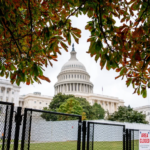The U.S. government’s road safety agency has reopened an investigation into Tesla’s “Full Self-Driving” (FSD) system following reports of crashes occurring in low-visibility conditions, including one incident that resulted in the death of a pedestrian. The National Highway Traffic Safety Administration (NHTSA) announced the probe on Thursday, prompted by four crashes involving Teslas navigating areas with poor visibility due to sun glare, fog, and airborne dust.
The NHTSA will examine how well the FSD system can detect and respond to reduced roadway visibility and the circumstances surrounding these incidents. This investigation encompasses approximately 2.4 million Tesla vehicles produced from the 2016 to 2024 model years.
In its report, the NHTSA detailed that one of the crashes led to a pedestrian’s death, while another resulted in injuries. As part of the investigation, the agency will also explore whether other crashes involving the FSD system occurred under similar low visibility conditions and whether software updates have impacted the system’s performance in these situations.
The agency’s documents indicate that investigators will focus on the timing and purpose of any updates made to the FSD system and assess Tesla’s evaluation of their safety implications. Tesla has been approached for comments regarding the investigation, but no response has been provided as of early Friday.
Tesla has consistently maintained that its FSD system does not operate autonomously, emphasizing that human drivers must always be prepared to take control. This assertion comes amid ongoing scrutiny over the system’s capabilities. Last week, Tesla hosted an event at a Hollywood studio to introduce a fully autonomous robotaxi devoid of a steering wheel or pedals. CEO Elon Musk stated the company aims to have fully autonomous vehicles on the roads next year, with robotaxis expected to roll out by 2026.
This investigation follows two prior recalls of the FSD system prompted by safety concerns raised by the NHTSA. In July, the agency sought information from law enforcement and Tesla after a vehicle using the FSD system struck and killed a motorcyclist near Seattle. The recalls were necessitated by the system’s programming, which allowed it to run stop signs at low speeds and violate other traffic laws.
Critics of Tesla’s FSD system argue that the reliance on cameras alone is insufficient for fully autonomous driving, highlighting that most competitors in the autonomous vehicle industry incorporate radar and laser sensors to improve performance in low-light and adverse weather conditions. As the investigation unfolds, the NHTSA aims to address these critical safety concerns while Tesla continues to pursue its ambitious goals in the autonomous driving space.









